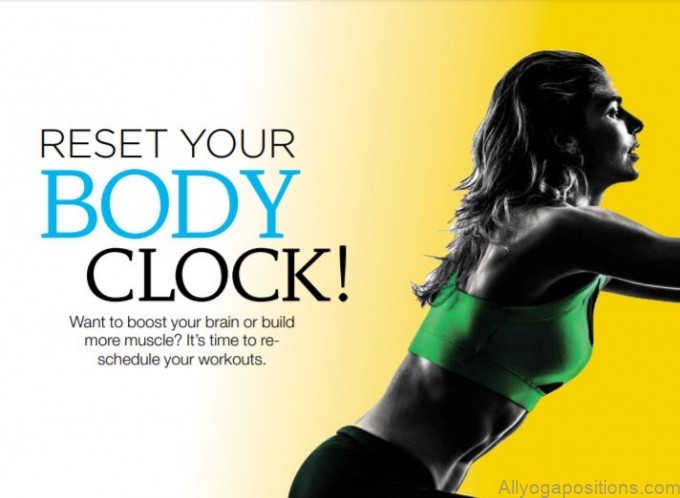Want to boost your brain or build more muscle? It’s time to reschedule your workouts.
What’s your favourite time to work out? Perhaps you can’t survive the office without hitting the gym first thing. Or maybe you swear by a run to help you wind down after a long day. But did you know your workout timing can influence your workout success? Or that you can schedule your workouts to match your goals, from losing weight to building muscle? It’s all down to your body’s circadian rhythms or body clocks, says Dr Satchin Panda, author of new book The Circadian Code (Vermilion, £12.99). We’re all aware of the inner body clock that helps us wake and sleep. But, in fact, each of your body’s cells has its inner clock, programmed to turn on or off specific genes at different times of day or night, influencing every aspect of your health. ‘Even your muscles have a circadian rhythm,’ says Dr Panda. Here’s how to use these rhythms to boost your fitness.
RESET YOUR BODY CLOCK! Photo Gallery
Sleep better EARLY MORNING
It doesn’t just get your day off to a flying start. An early-morning outdoor workout offers all-round benefits for your health. Exercising in bright daylight synchronises your brain clock, triggering your body’s systems – from digestion to co-ordination – to work smoothly through the day and ensure you’ll sleep well at night. Need to squeeze IN your morning session before the kids get up or your working day begins? No need to wait until sunrise in winter. ‘You can start anywhere from 30 minutes to two hours before or after sunrise,’ says Dr Panda, professor at the Salk Institute for Biological Studies. ‘Outdoor light during this time is an ideal amount to activate the blue light sensors in your eyes.’
Boost your brain EARLY MORNING
Getting active outdoors first thing also sends messages to your brain, increasing mental alertness. ‘Morning outdoor exercise is an important mechanism for maintaining and enhancing brain function,’ says Dr Panda. ‘It will improve your mood for the rest of the day and can help reduce depression. Prefer to exercise in the gym? Find a spot that’s next to a large glass window or under bright light to ensure you get some daylight benefits.
Build muscle EARLY EVENING
Another ideal time for getting active is late afternoon or early evening – anytime from 3pm to before your evening meal. ‘At this time of day, muscle tone naturally begins to rise, so it’s the best time for strength training, including weight lifting, or vigorous exercise such as intense indoor cycling,’ says Dr Panda. High-intensity athletes often exercise before a protein-rich dinner to help them repair muscle, build muscle mass, and promote recovery. ‘Your muscles absorb and use nutrients in the late afternoon, when repair occurs.’
Get a PB LATE AFTERNOON
Want to smash that Spin session or up your 10K run time? It may be best to wait until later in the day. Even exercise performance has its own circadian clock, and research shows that performance, even among competitive athletes, can vary by as much as 25 per cent within a day, according to Dr Panda. ‘Motor co-ordination and strength peaks in late afternoon, which aids sports performance. Blood flow and blood pressure are also high in the afternoon, whic If you’re aiming to get maximum benefit from exercise with minimum injury, afternoon is the best time to exercise, he confirms.
Lose weight EARLY EVENING
For all exercisers, late-afternoon or evening exercise has two other useful benefits. It helps reduce hunger at dinner time so you may eat less if you’re trying to lose weight. Plus, as little as 15 minutes of evening exercise will boost your muscles’ ability to absorb blood glucose and keep it in the healthy range.’ Exercise helps reduce your hunger hormone, ghrelin, and increases satiety hormones which are under circadian control. Intense exercise has a stronger benefit than moderate.
Prevent diabetes AFTER DINNER
Need to keep your blood-sugar levels steady? ‘A post-dinner workout can soak up a good amount of blood glucose, reducing the blood glucose spike after an evening meal,’ says Dr Panda. ‘Since insulin release declines in the evening, for anyone at risk of type 2 diabetes, physical activity in the evening is like taking a diabetes pill to reduce blood sugar.’ Avoid doing high-intensity exercise too late, though – it could disrupt your sleep.
HAVE A WORKOUT SNACK
No time for a long workout? No problem. ‘Dividing your workouts into 10- to 15-minute blocks through the day woks perfectly, because exercising during both early morning and late afternoon can boost your circadian rhythm,’ says Dr Panda. ‘Our ancestors were active throughout their day, but especially in the morning and evening. Many animals in the wild are active at dawn and dusk, so there was a greater need for hunter-gatherer humans to be active around these two periods of the day.’
Table of Contents


